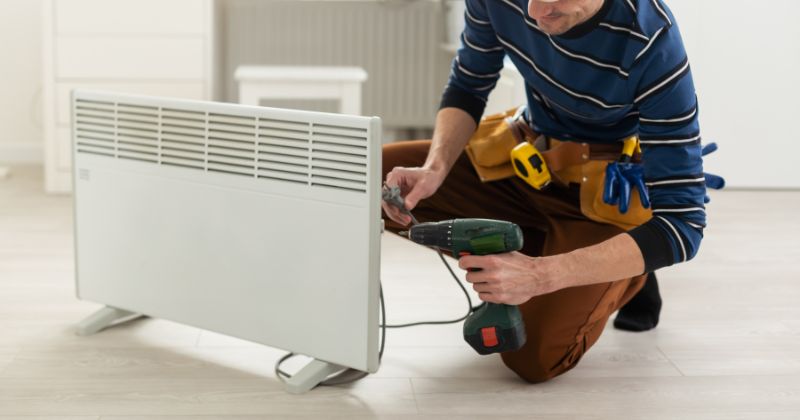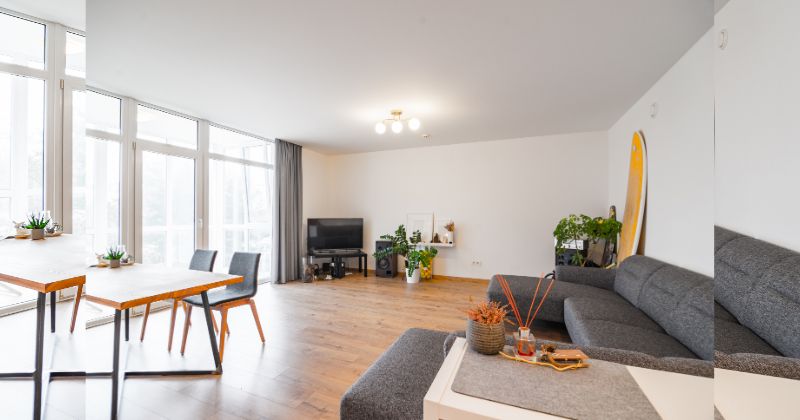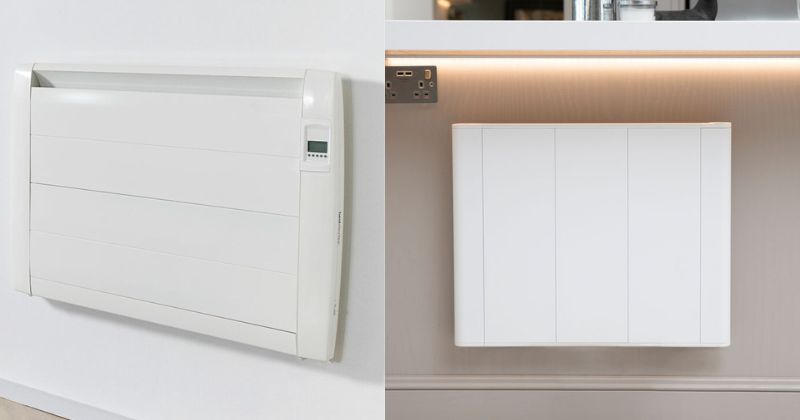As the demand for eco-friendly and efficient heating solutions continues to rise, panel heaters vs electric radiators have emerged as popular choices for UK homeowners seeking to warm their homes without compromising on environmental sustainability.
With the market for these electric heating systems witnessing a remarkable growth of nearly 15% over the past decade, it’s clear that more and more people are embracing the benefits of clean, smoke-free, and gas-free heating.
While both panel heaters and electric radiators offer an environmentally conscious way to heat your home, they differ in several key aspects that can impact their performance, efficiency, and suitability for various room sizes and heating needs.
Understanding the differences between Panel Heaters vs Electric Radiators is crucial for homeowners to make an informed decision that aligns with their specific requirements and preferences.
From their heating mechanisms and temperature controls to safety features, noise levels, and energy consumption, panel heaters and electric radiators exhibit distinct characteristics that can significantly influence the warmth, comfort, and overall experience they provide in your living spaces.
This comprehensive article delves into 11 key areas that set panel heaters and electric radiators apart, shedding light on their unique strengths and potential limitations.
By exploring these differences in depth, you’ll gain valuable insights to help you make a strategic choice that not only ensures cosy heating but also delivers long-lasting satisfaction and peace of mind.

What are Electric Panel Heaters?
A panel heater is a flat, wall-mounted electric heater unit designed to warm up rooms through natural convection currents as the heat rises from its surface. These heaters come in the form of narrow boards that can be tucked behind furniture or wider slabs that can cover an entire wall.
Panel heaters operate by utilising heating elements inside the unit that get hot when switched on. This heat is then transferred through the panel’s exterior surface, gradually warming the surrounding air.
Some types of panel heaters incorporate infrared technology, allowing them to absorb and radiate energy as heat more efficiently without losing it through ventilation, making them highly energy-efficient options.
Understanding Electric Panel Heaters: Features and Ideal Use Cases
Electric panel heaters have become a popular choice for heating solutions in the UK, primarily due to their ability to warm up rooms quickly. Their compact design makes them an ideal fit for small spaces, rendering them a smart choice for many households.
Here’s a more detailed look at why panel heaters are a great option and where they work best:
| Feature | Description | Ideal Usage Scenario |
| Sleek, space-saving design | Panel heaters boast a sleek, flat profile that doesn’t protrude much from the wall, making them perfect for matching with your room’s aesthetic without compromising on valuable floor space. | Rooms where saving space is important. |
| Rapid Heating Method | Panel heaters are designed to warm up a room quickly by heating the cold air and pushing it out again, creating a convection current. | When you need quick warmth in rooms that are not used all the time or for short periods. |
| Easy Installation | Installing panel heaters is typically a straightforward process that may not require professional assistance in most cases. | Any room where you want to add heating without a significant installation hassle. |
| Portability | Panel heaters are generally lightweight and easy to move around if needed. | For those who need to change which rooms they want to heat or for people who move frequently. |
| Efficient short-term heating | Panel heaters are good at making a space warm quickly for a short period of time. | For making a room warm fast without needing to keep it warm for hours. |
| Cost-effectiveness | Panel heaters don’t typically cost much to purchase upfront. However, it’s important to remember that using them frequently can result in higher electricity bills over time. | If you’re looking for an affordable way to heat a room occasionally or for short periods. |
| User-friendly Control | Panel heaters come equipped with control features that allow you to set your desired temperature and heating duration. | For rooms used at specific times, such as a home office or a spare bedroom. |
| Built-in safety features | Panel heaters often have built-in safety features like overheating protection to prevent potential hazards. | Safe for use around children or pets. |
Electric panel heaters are a handy and convenient way to add warmth where and when you need it, making them an especially good fit for homes looking for an easy, efficient, and affordable heating solution for occasional or short-term use.
Comparing Panel Heaters vs Electric Radiators
Let’s explore these differences between panel heaters vs electric radiators across various aspects, from design to eco-friendliness, helping you make an informed decision.
1. Design and Aesthetics
Panel heaters are sleek and modern. They fit well in any space without taking much room. Electric radiators, while slightly bulkier, offer a classic and stylish look that can feel more substantial. Both have their charm, depending on your home’s style.
2. Installation and Ease of Use
Installing panel heaters and electric radiators is simple. They’re both designed for quick setup. Electric radiators may require a bit more effort to programme but are still straightforward. Both options are user-friendly, with simple controls for everyday use.
3. Energy Efficiency
When using energy wisely, electric radiators often have the edge. They’re good at holding heat, which means they can be more efficient in the long run. Panel heaters warm up fast but might use more energy to keep a room warm over time.
4. Heating Performance
Panel heaters are known for their ability to warm up a room quickly, making them perfect for short-term or occasional use.
Electric radiators, on the other hand, take longer to heat up initially, but once they do, they provide a consistent and evenly distributed temperature throughout the space.
This can make them a better choice for situations that require longer periods of continuous heating.
5. Cost-Effectiveness
Both panel heaters and electric radiators come with their own cost considerations. While panel heaters might be more affordable in terms of the initial investment, their potentially higher energy consumption over time can lead to higher running costs.
Electric radiators tend to have a higher upfront cost, but their superior energy efficiency can result in lower long-term operating costs, potentially making them a more cost-effective option in the long run.
| Factor | Panel Heaters | Electric Radiators |
| Initial Investment | Generally lower | Higher but pays off with efficiency |
| Running Costs | Can be higher due to less efficiency | Lower in the long term due to better efficiency |
| Maintenance Costs | Typically low | Generally low but depends on model |
6. Safety Features
Safety is key, especially in homes with kids or pets. Both panel heaters and electric radiators have safety features like automatic shut-off to prevent overheating.
7. Maintenance and Durability
Electric radiators are known for their durability, often lasting many years with minimal maintenance. Panel heaters are also low maintenance but may have a shorter lifespan by comparison.
| Factor | Panel Heaters | Electric Radiators |
| Lifespan | Good | Excellent |
| Durability | Designed for less wear and tear | Built to last |
| Maintenance | Easy to clean and maintain | Minimal maintenance required |
8. Environmental Impact
Both panel heaters and electric radiators are more eco-friendly than fossil fuel options. However, the efficiency of electric radiators can make them a greener choice over time.
9. Control and Flexibility
Modern electric radiators and panel heaters often come with digital controls and timers and can even be smart home compatible. This makes it easy to keep your home at the perfect temperature.
10. Space Requirements
Whether you live in a large house or a small apartment, there’s an option. Panel heaters are great for small spaces, while electric radiators can effectively heat larger areas.
| Factor | Panel Heaters | Electric Radiators |
| Small Spaces | Ideal | Good, depending on the model |
| Large Homes | May need multiple units | Excellent coverage |
11. Aesthetic Integration
Panel heaters blend into modern homes with their minimalist design. Electric radiators, with a more traditional look, can add character to a room.
Choosing between panel electric heaters vs electric radiators depends on your specific needs. Consider how each option fits with your lifestyle, home, and budget. This comparison aims to help you make an informed and beneficial decision.

Best Locations: Electric Radiator vs Panel Heaters
Knowing the best spot to place your heater can make a big difference. It’s all about keeping you comfortable without wasting energy. Each room has its own needs.
Some rooms need quick warmth. Others need steady heat for a long time. Let’s see where electric panel heaters and electric radiators fit best in your home.
| Parts of House | Electric Panel Heaters | Electric Radiators |
| Living Room | Good for quick warmth during short use. | Better for constant, even heat during long periods. |
| Kitchen | Useful for quick heat while cooking or eating. | Works well for a steady temperature. |
| Bedroom | Ideal for heating just before bed and in the morning. | Best for overnight warmth. |
| Bathroom | Quick heating is handy for baths or showers. | Constant warmth is comforting. |
| The conservatory | Not ideal due to large glass areas and heat loss. | Excellent for maintaining a comfortable climate. |
| Hallway & Landing | Good for a quick warm-up as people come and go. | Suitable for continuous warmth in these areas. |
| Cloakroom | Quick heating works well in these small spaces. | Not usually necessary due to brief use. |
| Garage | Useful for heating up quickly when in use. | Ideal if used as a workshop for longer periods. |
| Office & Commercial | Good for offices needing a quick warm-up. | Better for steady warmth during work hours. |
Consider These Factors when Choosing the Right One for Your Home
Choosing between a panel heater or electric radiator takes more than picking a device. It means selecting the perfect fit for your home. Follow these tips to aid your decision.
Assessing Your Needs
Think about your room’s size and needs. Do you need quick warmth or steady heat? This shows if a panel heater or radiator works best. Small rooms favour both panel heaters and electric radiators while electric radiators suit larger areas needing cosy heat. Seeking advice from experts also helps understand suitable options.
Consultation and Purchase
Speak to knowledgeable suppliers about your home. Explain your lifestyle. They can recommend a solution that matches specific requirements. View options online and in stores to find excellent prices and features.
Heating Requirements and Preferences
Decide if fast heating or consistent warmth matters most. This helps choose whether a speedy panel heater or a durable electric radiator best fits your requirements.
Room Size and Insulation
Larger, well-insulated rooms suit electric radiators’ targeted heat. Smaller, draughty areas gain from a panel heater’s warmth, filling all spaces, however electric radiators will fit this purpose equally well with energy saving software such as Open Window Technology.. Explore our blog on the Electric Heater Size Guide for more information.
Energy Efficiency Goals
If saving money on bills is vital, inspect efficiency ratings. High-performing electric radiators prove economically efficient over the long term. For more insights, read our article on “Do Electric Heaters Use a Lot of Electricity?” to understand the efficiency of electric heaters.
Budget Considerations
Consider upfront price against running expenses. Affordable panels cost less initially, but efficient electric radiators eventually conserve fuel consumption.
Installation and Space Availability
Check wall space and simple do-it-yourself panel fitting. Electric radiators may require more room and may involve installation assistance.
Careful thought helps a satisfying buy meeting all winter heating desires for years ahead. Choosing correctly leads to cosy, economical warmth.

Make Your Home Cosier with the Right Electric Heating Solution
Understanding the differences between panel heaters vs electric radiators is crucial for making an informed decision. Panel heaters offer quick warmth and are ideal for smaller spaces or less frequent use.
On the other hand, electric radiators provide steady, efficient heat, making them perfect for larger areas or constant use.
Each option has unique benefits, from energy efficiency and cost-effectiveness to safety features and ease of installation. By weighing these factors, homeowners can choose the most suitable electric heating system. Browse our products online or visit our showroom for personalised recommendations.
Choose the Best Electric Radiators for Top Home Heating
As the UK’s leading supplier of high-quality electric radiators, we can help you select the perfect radiator to meet your household requirements. Our experts understand your needs better than anyone else, from family homes to commercial properties.
Speak to our friendly team to receive a free consultation and heating assessment. We will evaluate factors like room size, insulation, and energy goals to recommend the right panel heaters or electric radiators.
Contact us today to discuss customised strategies for heating every room efficiently and economically. Rely on our renowned customer service and reliability for comfortable warmth all year round.
FAQs
What Is the Difference Between a Panel Electric Heater and an Electric Radiator?
Panel electric heaters warm up quickly and are great for heating a room for a short time. They work by heating the air directly.
Electric radiators take a bit longer to heat up but keep the room warm for longer. They work by heating a fluid/ceramic inside them or the radiator, warming the air.
In short, panel heaters are for quick heat, and electric radiators are a permanent/longer lasting heating solution.
Are Panel Heaters Good for Large Rooms?
No, panel heaters are more suitable for small rooms and spaces than large ones. While they can heat up a large room, panel heaters are less effective at maintaining a consistent, even temperature throughout a large area over long periods.
Are Panel Heaters Effective?
Yes, panel heaters can be effective for heating needs when used in the right situation. They warm rooms quickly through convection, making them suitable for small rooms requiring brief warming or occasional heating.
Do Panel Heaters Dry the Air?
No, panel heaters do not dry the air. They heat the room efficiently without significantly reducing the air’s moisture content.
This makes them suitable for use in rooms susceptible to damp, as they can help dry out the walls and reduce mould formation, which is especially beneficial during the colder, damp-prone months.
Can You Sleep With a Panel Heater On?
No, it is not safe to sleep with a panel heater on. According to safety experts and
organisations like the Electrical Safety Foundation International (ESFI) and the National Fire Protection Association, space heaters, including panel heaters, should be kept from running unattended or while sleeping.
They are not designed to operate for extended periods without supervision. Always ensure someone is awake and nearby when a space heater is used to prevent potential hazards.






Leave a Reply